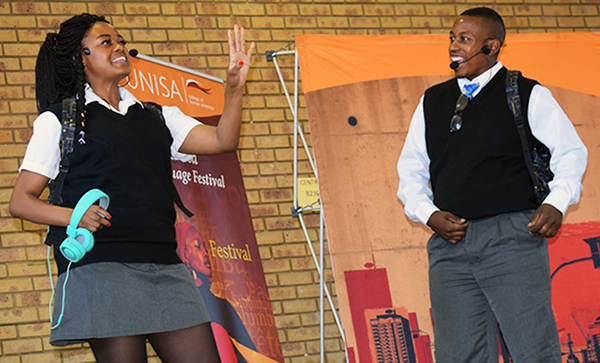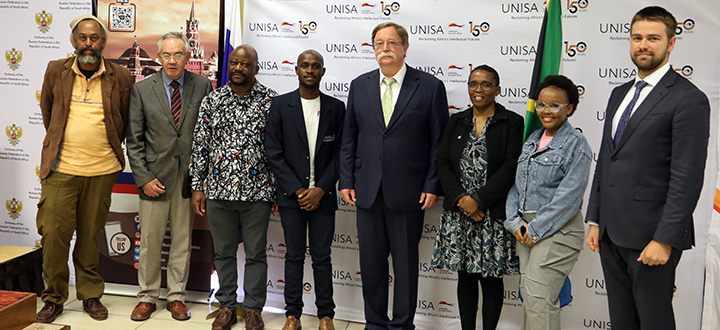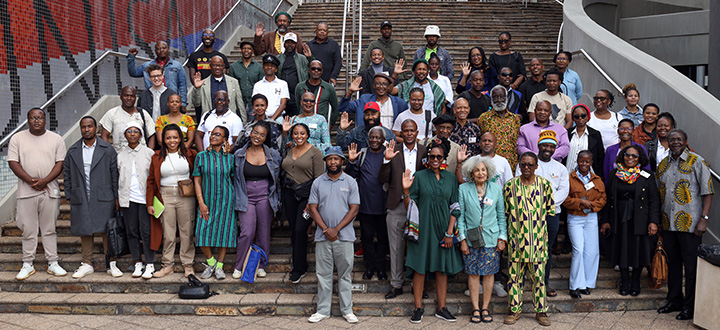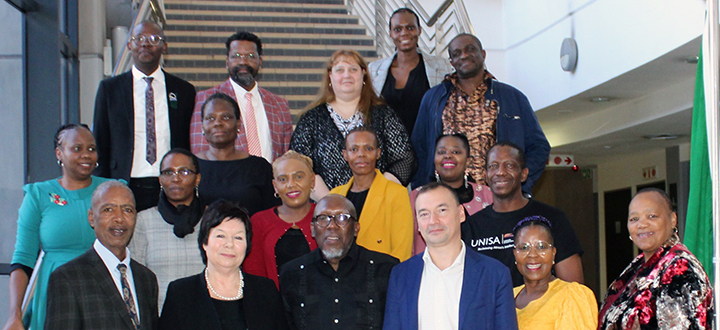College of Human Sciences
Unisa’s 2018 Language Festival roadshow kicks off at local school
The College of Human Sciences launched its 2018 Unisa Language Festival at Himalaya Secondary School in Laudium, Pretoria. The festival, held since 2004, celebrates South Africa and Africa’s diversity by showcasing the multilingual fields of study offered by Unisa through the college. Unisa currently offers studies in IsiZulu, IsiXhosa, IsiNdebele, Xitsonga, Sesotho, Sesotho sa Leboa, Setswana, SiSwati, Tshivenda, Afrikaans, English, Arabic, Biblical languages and Classics, French, Portuguese, and Chinese Mandarin, as well as linguistics and translation studies.

The cast of the 2018 Unisa Language Festival School Roadshow, Portia Moemedi and Pule Motale
The language festival is aligned with Unisa’s vision of being the African university shaping futures in the service of humanity and has, in the past, showcased all the different languages, cultural background and experiences through dramatic arts, poetry and music, dance and exhibitions. In 2017, Unisa changed the format of the festival from a one-day event to an educational industrial theatre roadshow to make an even larger impact. This was a resounding success.
The 2018 school roadshow is crafted to communicate Unisa’s offerings as well as excite and educate young South Africans about the different languages they can choose from when pursuing their future careers. Learners discover that language is verbal (the spoken word) and non-verbal (gestures and facial expressions). They learn that language is in poetry, in song, in drama, in folklore, in books, and in art.
The aim of the Unisa Language Festival is to stimulate a love for language and create an awareness on the career possibilities that studying language can bring; careers such as being an author, interpreter, journalist, and public speaking, among others.
You can watch the Language Festival roadshow via the College of Human Sciences Facebook page.
Touring 25 high schools in Gauteng
Unisa aims to leave a mark and to encourage young people to celebrate the different cultures and acknowledge that diversity can unite us as a country. The roadshow is touring 25 high schools in the Gauteng region and will also be supporting educators through the curriculum-aligned teacher workbooks be provided by Unisa.
As part of amplification for the programme, a competition has been included, encouraging learners to create a short video on their mobile phones demonstrating the variety of languages spoken in the country and Africa, as well as the careers one can enter into as a result of studying languages. Learners who are successful will win prizes up to R10 000 for themselves and their school. The school with the most entries will also receive a prize.
You can use language for anything
Learners and teachers at Himalaya Secondary School thanked Unisa’s College of Human Sciences for choosing their school to launch the Language Festival. In a Pretoria News article, Principal Vilasen Padyachy said the roadshow was a great initiative and something learners needed, as they often took languages for granted.
“This is the first time pupils were told about the importance of languages, and you could tell that they were excited and were paying attention. I am looking forward to seeing more of this initiative at the school and I really appreciate that Unisa brought this programme here.”
Vasco Mendes, a Grade 9 learner, said prior to the presentation he did not know there were careers available by just studying linguistics. “I got inspiration from the drama they performed for us, and now I know that you can use language for anything. I never thought of taking language as a subject at university, but right now, anything is possible,” he said.
The Portuguese-speaking pupil said he also got inspiration to speak his language proudly. “We are often scared to speak our own languages because of the fear that people might laugh at us, but today I was inspired that I should be proud to speak my language.”
The college’s Deputy Executive Dean, Dr Britta Zawada, said: “Languages are part of our identity and it is part of our effort to transform and decolonise. Even at the university we are beginning to use African languages even more; all the study material in history this semester and next year has been translated into five African languages.”
*By Rivonia Naidu-Hoffmeester
Publish date: 2018-11-05 00:00:00.0

 Unisa's student leadership engage with Russian ambassador
Unisa's student leadership engage with Russian ambassador
 Re-igniting and re-imagining Pan Africanism, Afrocentricity and Afrofuturism in the 21st century
Re-igniting and re-imagining Pan Africanism, Afrocentricity and Afrofuturism in the 21st century
 Unisa and Russian State University for the Humanities explore collaborative opportunities
Unisa and Russian State University for the Humanities explore collaborative opportunities
 Young Unisa science stars join elite Lindau Nobel Laureate group
Young Unisa science stars join elite Lindau Nobel Laureate group
 Education MEC addresses Unisa autism seminar
Education MEC addresses Unisa autism seminar